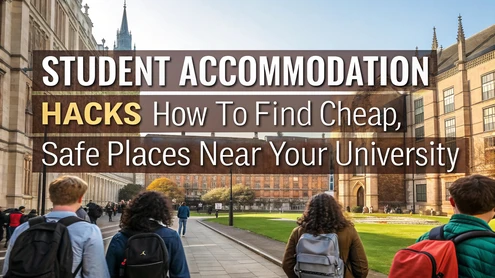Finding student accommodation that is both affordable and safe can feel like an overwhelming challenge — especially if you’re moving to a new city or country for university. But don’t worry! With the right strategies, some insider tips, and a bit of patience, you can secure a place that suits your budget and keeps you safe, all without too much stress. Here’s a detailed guide packed with student accommodation hacks to help you navigate this important part of your university journey.
1. Start Early and Plan Ahead
One of the biggest hacks for finding good student accommodation is simply to start your search early. The earlier you start, the better your chances of snagging a place that fits your needs without breaking the bank.
-
Why early? Student housing fills up fast, especially near popular universities. Waiting until the last minute limits your options to more expensive or less desirable places.
-
Tip: Set a timeline—start looking at least 3 to 4 months before your academic year begins. If possible, visit the area beforehand or use virtual tours to get a feel for the neighborhoods.
2. Use Multiple Sources to Search
Don’t rely on just one platform to find accommodation. Different websites, social media groups, and university noticeboards offer different listings, and you might miss a great deal by sticking to just one.
-
Online platforms: Popular websites like Student.com, Uniplaces, or local rental sites often have a wide range of options.
-
University resources: Many universities provide student accommodation services or list verified private housing options.
-
Social media and student forums: Facebook groups or WhatsApp groups for your university’s student community can be treasure troves for sublets and roommate requests.
-
Local bulletin boards: Sometimes, physical noticeboards at libraries or community centers have postings from landlords seeking tenants.
3. Consider Sharing Accommodation
Renting a place on your own can be expensive, so sharing with roommates is one of the best ways to save money. This also means you can afford a better location or safer neighborhood.
-
Advantages: Shared rent lowers costs, shared utilities can save money, and roommates can provide company and a sense of security.
-
How to find roommates: University housing offices often have roommate matching services. Social media groups are also useful for finding people looking for shared housing.
-
Important: Always meet potential roommates beforehand and discuss rules about cleanliness, guests, noise, and bills to avoid conflicts.
4. Look Beyond University Halls of Residence
While university dormitories can be convenient, they aren’t always the cheapest or the safest option. Private rentals often offer better value, more privacy, and sometimes even safer neighborhoods.
-
Check neighborhoods: Use maps to find areas near your university that are known to be safe but more affordable than student-dense areas.
-
Public transport: If you find a cheaper place a bit farther away, check for easy access to buses or trains to get to campus quickly.
-
Safety check: Use local crime maps or apps to research the safety of different neighborhoods before committing.
5. Negotiate Rent and Lease Terms
Many students don’t realize rent prices can sometimes be negotiated, especially if the landlord has been trying to rent the property for a while.
-
How to negotiate: Show that you are a responsible tenant by offering references, proof of income or financial aid, and explaining your situation. Propose a reasonable offer based on your research of similar listings.
-
Flexible lease terms: Ask if the landlord offers shorter leases or breaks during the summer, which might save money if you’re only staying for the academic year.
6. Check What’s Included in the Rent
Sometimes “cheap” rent isn’t really cheap if you have to pay extra for utilities, internet, or furniture. Always ask what is included before signing anything.
-
Utilities: Confirm whether water, electricity, heating, or gas bills are included.
-
Internet: Check if Wi-Fi is provided or if you need to arrange and pay for your own.
-
Furniture: Fully furnished apartments might save you money upfront compared to unfurnished ones where you’ll have to buy or rent furniture.
-
Other fees: Ask about any extra costs like security deposits, maintenance fees, or parking charges.
7. Prioritize Safety Features
Your safety is non-negotiable. While affordability is important, don’t sacrifice safety for a cheaper place.
-
Safe neighborhoods: Research crime rates and ask current students or locals about which areas are considered safe.
-
Building security: Look for accommodations with security guards, CCTV cameras, secure locks, and well-lit entrances.
-
Roommate and landlord checks: Vet your roommates and landlords carefully. Read reviews if available and meet in person or video call before finalizing.
-
Emergency contacts: Know the local emergency numbers and locate the nearest hospital or police station.
8. Consider Alternative Accommodation Options
If traditional rentals are too pricey, think outside the box.
-
Homestays: Living with a local family can be cheaper and safer, plus you get a built-in support system.
-
Co-living spaces: These modern accommodations are designed for students and young professionals, often with inclusive amenities and a strong community.
-
Hostels or short-term rentals: Some students rent hostels or short-term rentals during the first few weeks and then look for a more permanent place once settled.
-
University partnerships: Some universities partner with local housing providers offering discounted or vetted student housing.
9. Inspect the Property Thoroughly
Never rent sight unseen if you can avoid it. A thorough inspection can save you from nasty surprises.
-
Check for repairs: Look for leaks, broken windows, faulty wiring, or pests.
-
Safety features: Ensure smoke detectors and fire extinguishers are installed and working.
-
Test appliances: Turn on taps, flush toilets, check heating and cooling.
-
Neighborhood vibe: Visit the neighborhood at different times of the day to assess noise levels and safety.
10. Get Everything in Writing
Once you’ve found the perfect place, don’t skip the paperwork.
-
Rental agreement: Ensure your lease includes rent amount, payment schedule, duration, and rules about deposits, repairs, and termination.
-
Inventory checklist: Document the condition of the property and any furniture to avoid disputes later.
-
Receipts: Always get receipts for rent and deposits paid.
Bonus Tips for Finding Cheap and Safe Student Accommodation
-
Use student discounts: Some landlords or housing companies offer discounts to students.
-
Ask for referrals: Current students or university staff might know of hidden gems.
-
Be flexible: Sometimes slightly longer commutes or shared bathrooms can significantly reduce rent.
-
Budget carefully: Factor in all monthly costs — rent, transport, groceries, internet — to avoid surprises.
-
Trust your instincts: If something feels off or too good to be true, take a step back and reassess.
Final Thoughts
Finding cheap and safe student accommodation near your university doesn’t have to be a nightmare. With early planning, a wide search, a willingness to share, and a keen eye for safety and value, you can secure a great place that feels like home throughout your studies. Remember, it’s not just about saving money—it’s about creating a comfortable, secure environment where you can focus on your academic and personal growth.



